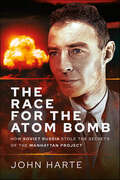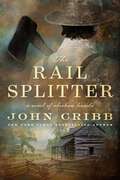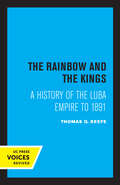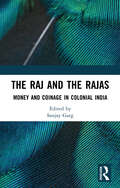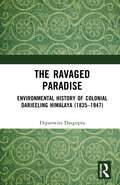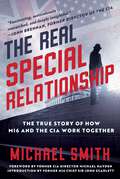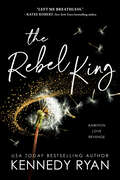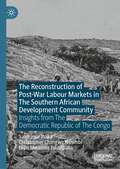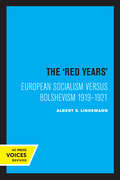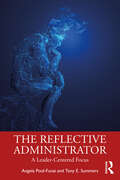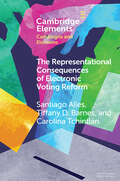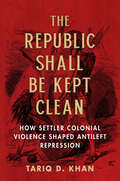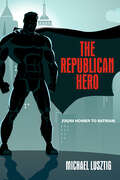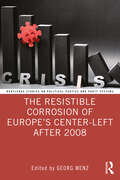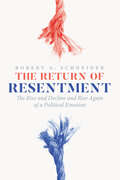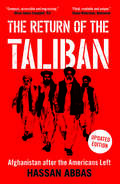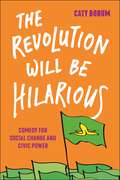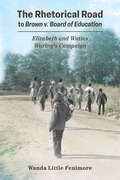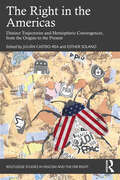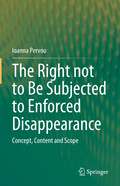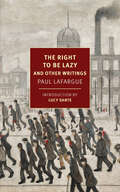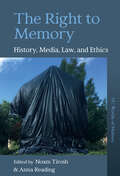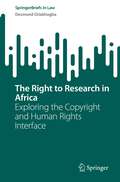- Table View
- List View
The Race for the Atom Bomb: How Soviet Russia Stole the Secrets of the Manhattan Project
by John HarteDescribes how Soviet Russia’s leading spymasters in Moscow Center obtained information from British and American physicists to make an atomic bomb. When Nazi Germany began a secret weapons program called “The Uranium Club” in April 1939, Stalin was alerted by his American and British spies of the possibility that German scientists were working to develop an atomic bomb. The British Government and the United States, and Stalin, realized that if Hitler used The Atom Bomb, it could mean the end of the West or the end of the world. John Harte’s new book about The Manhattan Project describes how Soviet Russia’s leading spymasters in Moscow Center obtained information from British and American physicists to make a Soviet atomic bomb at each and every stage when the American bomb was developed at Los Alamos in New Mexico.
The Rail Splitter: A Novel
by John CribbFrom John Cribb, author of the acclaimed novel Old Abe, comes a new work of historical fiction that brings Abraham Lincoln to life as never before.The Rail Splitter tells the story of Abraham Lincoln's remarkable journey from a log cabin to the threshold of the White House—a journey that makes him one of America's most beloved heroes. We walk beside him on every page of this spellbinding novel and come to know his hopes and struggles on his winding path to greatness. The story begins with Lincoln's youth on the frontier, where he grows up with an ax in one hand and book in the other, determined to make something of himself. He sets off on one adventure after another, from rafting down the Mississippi River to marching in an Indian war. When he is twenty-six, the girl he hopes to marry dies of fever. He spends days wandering the countryside in grief. A few years later, he purchases a ring inscribed with the words "Love Is Eternal" and enters a tempestuous marriage with Mary Todd. Lincoln literally wrestles his way to prominence on the Illinois prairies. He teaches himself the law and enters the rough and tumble world of frontier politics. With Mary's encouragement, he wins a term in the US Congress, but his political career falters. They are both devastated by the loss of a child. As arguments over slavery sweep the country, Lincoln finds something worth fighting for, and his debates with brash rival Stephen Douglas catapult him toward the White House. Part coming-of-age story, part adventure story, part love story, and part rags-to-riches story, The Rail Splitter is the making of Abraham Lincoln. The story of the rawboned youth who goes from a log cabin to the White House is, in many ways, the great American story. The Rail Splitter reminds us that the country Lincoln loved is a place of wide-open dreams where extraordinary journeys unfold.
The Rainbow and the Kings: A History of the Luba Empire to 1891
by Thomas Q. ReefeThis title is part of UC Press's Voices Revived program, which commemorates University of California Press’s mission to seek out and cultivate the brightest minds and give them voice, reach, and impact. Drawing on a backlist dating to 1893, Voices Revived makes high-quality, peer-reviewed scholarship accessible once again using print-on-demand technology. This title was originally published in 1981.
The Raj and the Rajas: Money and Coinage in Colonial India
by Sanjay GargThe decline of the Mughal Empire, the political ascendency of the British East India Company, a number of revivalist powers (the Sikhs, the Marathas, the Rohillas, etc.), and a large number of Indian princely states, resulted in redrawing the political spaces across India. In the process, the minting rights of the titular Mughal king and of the neo-independent Indian princely rulers were severely curbed by the dominant colonial power, both for political as well as economic reasons. The territorial expansion of the British Empire in India was invariably followed by the abolition of the native mints and the introduction of the imperial currency in the annexed territories. Indeed, the ‘sikka’ followed the flag. By presenting the monetary history of this period, this volume seeks to address some of the questions, viz. the effect of money supply on trade, prices of commodities and services, wage structures in different regions as well as on the administrative and military health of a political power. In this unique anthology, published studies along with unpublished archival records have been integrated into an overall theme. Together with a comprehensive bibliography-cum-list for further readings this volume is aimed to serve as a veritable reference tool.
The Ravaged Paradise: Environmental History of Colonial Darjeeling Himalaya (1835–1947)
by Dipanwita DasguptaThis book makes a systematic attempt to explore the environmental history of Darjeeling during the British colonial period (1835-1947), which profoundly transformed the environment of Darjeeling by introducing commercial control over the natural resources. After the foundation of Darjeeling as the hill station for the low-income groups of British administration living in Bengal and Burma, the place was transformed into a social, recreational and commercial centre for the British authorities. The railway construction boom, introduction of tea plantation, the growth of a commercial market for timber and increasing demands for fuel and building materials depleted the forest cover. The less explored regions of Darjeeling attracted the adventure-thirsty Britons. A series of investigations were made on the marketable products, the condition of roads, and quality of soil of these regions. The ethnographic, geological, botanical and zoological study of the Darjeeling was started by the colonial officials in the nineteenth century. In the early stage of expansion of colonialism in Asia, Africa, Australia and South America, the European colonizers faced numerous problems in dealing with the untouched nature. The accumulation of the knowledge of surrounding regions and proper management of the labour became essential for the colonial authority for transformation of the existing environment of the densely forested tropical colonies. Taylor and Francis does not sell or distribute the print editions of this book in India, Pakistan, Nepal, Bhutan, Bangladesh and Sri Lanka.
The Real Special Relationship: The True Story of How MI6 and the CIA Work Together
by Michael SmithGripping, deeply researched, and authoritative, the history of one of the closest intelligence and security relationships in the world The Special Relationship between the United States and Britain is touted by politicians when it suits their purpose and, as frequently, dismissed as myth, not least by the media. Yet the truth is that the two countries are bound together more closely than either is to any other ally. In The Real Special Relationship, Michael Smith reveals how it all began, eighty years ago, when a top-secret visit by four American codebreakers to Bletchley Park in February 1941—ten months before the US entered World War II—marked the start of a close collaboration between the intellitence services of the two nations. When that war ended and the Cold War began, both sides recognized that the way they worked together to decode German and Japanese ciphers could be used to counter the Soviet threat. They laid the foundation for the behind-the-scenes intelligence sharing that has continued—despite rivalries among the services and occasional political conflict and public disputes between the two nations—through the collapse of the Soviet Union, 9/11, the wars in Afghanistan and Iraq, and to the threats of the present moment. Smith, who served in British military intelligence, brings together a fascinating range of characters, from Winston Churchill and Ian Fleming to John F. Kennedy, Ronald Reagan, Margaret Thatcher, and Edward Snowden. Supported by in-depth interviews and a broad range of personal contacts in the intelligence community, he takes the reader into the workings of MI6, the CIA, the NSA, and all those who strive to keep us safe. Sir John Scarlett, former chief of MI6, has written the introduction, and Michael Hayden, former director of the CIA and the NSA, has provided the foreword.
The Rebel King (All The King's Men #2)
by Kennedy RyanFrom beloved, RITA-award-winning author Kennedy Ryan comes the gripping, passionate finale of the All the King's Men duology.Though surrender is what Maxim Cade demanded of Lennix Hunter's body and heart, she had other plans. They were fast-burning fascination and combustible chemistry, the son of an oil baron and the Apache daughter at war with his family, but she trusted him, and he turned out to be a thief who stole her love.Still, if what they had was a lie, why had it felt so real?Now, the man she swore to hate is about to have it all, and he wants Lennix at his side. But when the two of them are forced to face the unthinkable, their rocky foundation is tested, as is the invisible thread that seems to wind their fates together. As they navigate a treacherous political landscape in their quest for justice, Maxim and Lennix soon learn that power is a game, and they are merely the pawns and players. Facing insurmountable odds, will they win the world, or will they lose it all?
The Reconstruction of Post-War Labour Markets in The Southern African Development Community: Insights from The Democratic Republic of The Congo
by Christopher Changwe Nshimbi Leon Mwamba Tshimpaka Saint José InakaThis book provides a comprehensive overview of post-war labour market reconstructions, in the context of a regional bloc whose member states have experienced conflict. Focusing on the Southern African Development Community (SADC) region, the book explores how major conflicts often expose shortcomings in affected countries particularly on their post-war labour market reconstruction processes. The authors discuss how countries in the SADC region in particular are equipped to navigate such processes. This key question drives the overview of relationships between labour market issues and wars of liberation from colonial rule and apartheid, rights to self-determination and racial (in)equality and the need to succinctly explain how labour market issues shaped civil wars in some post-independent SADC member states. The book examines the role of the state in reconstruction processes of post-war labour markets and the contribution of labour market institutions to these reconstructions. It further analyses private sector participation in remaking labour markets and workers’ experiences in finding employment in labour markets under reconstruction. The book provides specific insights from experiences in the Democratic Republic of the Congo (DRC).
The Red Years: European Socialism versus Bolshevism 1919–1921
by Albert S. LindemannThis title is part of UC Press's Voices Revived program, which commemorates University of California Press’s mission to seek out and cultivate the brightest minds and give them voice, reach, and impact. Drawing on a backlist dating to 1893, Voices Revived makes high-quality, peer-reviewed scholarship accessible once again using print-on-demand technology. This title was originally published in 1974.
The Reflective Administrator: A Leader-Centered Focus
by Angela Pool-Funai Tony SummersThe Reflective Administrator takes the well-grounded theories of reflective thought out of the classroom setting and delivers them into the public sector workplace. The intentional practice of reflection is useful not only with regard to experiential learning in public administration education but also within the profession itself. The text dispels misconceptions about what reflective practice entails and offers the reader practical tools to implement in both the classroom and professional environments. The book begins by walking the reader through a foundational overview of reflective thought theory, cultivates understanding of reflection in practice, then closes the loop by helping the reader to conceptualize the ideas presented and offering applicable takeaways for both students and practitioners. Chapters utilize real-world case studies which detail work environment interactions, planning, and outcomes. These provide opportunities to examine and dissect individual and group dynamics using a reflective practice lens. The Reflective Administrator offers a fresh perspective on the utility of reflective thought in public service for professional growth and leadership development, and it will be a key resource for students as well as public administration practitioners.
The Reflective Administrator: A Leader-Centered Focus
by Angela Pool-Funai Tony SummersThe Reflective Administrator takes the well-grounded theories of reflective thought out of the classroom setting and delivers them into the public sector workplace.The intentional practice of reflection is useful not only with regard to experiential learning in public administration education but also within the profession itself. The text dispels misconceptions about what reflective practice entails and offers the reader practical tools to implement in both the classroom and professional environments. The book begins by walking the reader through a foundational overview of reflective thought theory, cultivates understanding of reflection in practice, then closes the loop by helping the reader to conceptualize the ideas presented and offering applicable takeaways for both students and practitioners. Chapters utilize real-world case studies which detail work environment interactions, planning, and outcomes. These provide opportunities to examine and dissect individual and group dynamics using a reflective practice lens.The Reflective Administrator offers a fresh perspective on the utility of reflective thought in public service for professional growth and leadership development, and it will be a key resource for students as well as public administration practitioners.
The Representational Consequences of Electronic Voting Reform: Evidence from Argentina (Elements in Campaigns and Elections)
by Tiffany D. Barnes Santiago Alles Carolina TchintianBallots and voting devices are fundamental tools in the electoral process. Despite their importance, scholars have paid little attention to the broader implications of voting procedures. In this Element, the authors contend that ballots have significant implications for democratic representation, as they affect the cost associated with voting for citizens and electioneering for elites. This Element explains how ballot designs affect the behavior of voters, the performance of candidates, and the strategies of parties. It shows how voting procedures structure the likelihood of vote splitting and ballot roll-off. This in turn has implications for candidates. Focusing on gender and experience, this Element shows how ballot form alters the salience of personal vote earning attributes. With respect to political parties, ballot structure can shift both the cost, strategies, and ultimately electoral fortunes of political parties. Finally, it discusses the profound implications ballot forms have for party campaigns and election outcomes.
The Republic Shall Be Kept Clean: How Settler Colonial Violence Shaped Antileft Repression
by Tariq D. KhanThe long relationship between America’s colonizing wars and virulent anticommunism The colonizing wars against Native Americans created the template for anticommunist repression in the United States. Tariq D. Khan’s analysis reveals bloodshed and class war as foundational aspects of capitalist domination and vital elements of the nation’s long history of internal repression and social control. Khan shows how the state wielded the tactics, weapons, myths, and ideology refined in America’s colonizing wars to repress anarchists, labor unions, and a host of others labeled as alien, multi-racial, multi-ethnic urban rabble. The ruling classes considered radicals of all stripes to be anticolonial insurgents. As Khan charts the decades of red scares that began in the 1840s, he reveals how capitalists and government used much-practiced counterinsurgency rhetoric and tactics against the movements they perceived and vilified as “anarchist.” Original and boldly argued, The Republic Shall Be Kept Clean offers an enlightening new history with relevance for our own time.
The Republican Hero: From Homer to Batman
by Michael LusztigPolitically speaking, do heroes matter? Are we living in a post-heroic age? The Republican Hero addresses both these questions. The general tenor of modern thinking is that heroes do matter but that the modern age is characterized by a narrowing of moral horizons once illuminated by heroes, secular and spiritual. Michael Lusztig argues that the modern world is not post-heroic. He makes the case that the modern age is the most heroic age, if measured in terms of the Aristotelian currency of balance and completeness. To this end, he identifies four main hero-types—the epic, magnanimous, Romantic, and common. Each can rightfully be called a republican hero: each contributes to the promotion or protection or provision of republican values. Each exemplifies the heroic virtues of their age. However, taken conjunctively, each contributes to what Lusztig conceives as the complete republican hero of the modern age.
The Resistible Corrosion of Europe’s Center-Left After 2008 (Routledge Studies on Political Parties and Party Systems)
by Georg MenzThis book examines and explains the Center-Left’s political decline since 2008, whilst analyzing the factors that account for its sagging electoral and popular support, losing voters both to the Far-Left, the Far-Right, and abstentions. Focusing on the era since the 2008 financial crisis in particular, while also charting the historical genealogy that led to the current impasse, the book examines how, when and why the collapse of Europe’s Center-Left occurred. Moving beyond existing and slightly dated accounts, the contributors explore why Social Democrats lack compelling answers to pressing current policy challenges. Faced with a decline in its core clientele, namely blue-collar workers, the Center-Left is being outflanked and risks permanently jeopardizing its erstwhile status as representing a catch-all party. Exploring one of the more pressing and timely political puzzles of the contemporary political scene in Europe, the book identifies six factors that have driven the decline of the Left and examines them systematically across eight countries: France, the United Kingdom, Germany, Sweden, Italy, Austria, the Netherlands, and Denmark. This book will be of particular interest to both scholars and students of social democracy, political parties, and the politics of the Left and more broadly to those interested in European and comparative politics, governance, and contemporary history.
The Return of Resentment: The Rise and Decline and Rise Again of a Political Emotion (The Life of Ideas)
by Robert A. SchneiderCharts the long history of resentment, from its emergence to its establishment as the word of the moment. The term “resentment,” often casually paired with words like “hatred,” “rage,” and “fear,” has dominated US news analysis since November 2016. Despite its increased use, this word seems to defy easy categorization. Does “resentment” describe many interlocking sentiments, or is it just another way of saying “anger”? Does it suggest an irrational grievance, as opposed to a legitimate callout of injustice? Does it imply political leanings, or is it nonpartisan by nature? In The Return of Resentment, Robert A. Schneider explores these questions and more, moving from eighteenth-century Britain to the aftermath of the French Revolution to social movements throughout the twentieth century. Drawing on a wide range of writers, thinkers, and historical experiences, Schneider illustrates how resentment has morphed across time, coming to express a collective sentiment felt by people and movements across the political spectrum. In this history, we discover resentment’s modernity and its ambiguity—how it can be used to dismiss legitimate critique and explain away violence, but also convey a moral stance that demands recognition. Schneider anatomizes the many ways resentment has been used to label present-day movements, from followers of Trump and supporters of Brexit to radical Islamicists and proponents of identity politics. Addressing our contemporary political situation in a novel way, The Return of Resentment challenges us to think critically about the roles different emotions play in politics.
The Return of Resentment: The Rise and Decline and Rise Again of a Political Emotion (The Life of Ideas)
by Robert A. SchneiderCharts the long history of resentment, from its emergence to its establishment as the word of the moment. The term “resentment,” often casually paired with words like “hatred,” “rage,” and “fear,” has dominated US news analysis since November 2016. Despite its increased use, this word seems to defy easy categorization. Does “resentment” describe many interlocking sentiments, or is it just another way of saying “anger”? Does it suggest an irrational grievance, as opposed to a legitimate callout of injustice? Does it imply political leanings, or is it nonpartisan by nature? In The Return of Resentment, Robert A. Schneider explores these questions and more, moving from eighteenth-century Britain to the aftermath of the French Revolution to social movements throughout the twentieth century. Drawing on a wide range of writers, thinkers, and historical experiences, Schneider illustrates how resentment has morphed across time, coming to express a collective sentiment felt by people and movements across the political spectrum. In this history, we discover resentment’s modernity and its ambiguity—how it can be used to dismiss legitimate critique and explain away violence, but also convey a moral stance that demands recognition. Schneider anatomizes the many ways resentment has been used to label present-day movements, from followers of Trump and supporters of Brexit to radical Islamicists and proponents of identity politics. Addressing our contemporary political situation in a novel way, The Return of Resentment challenges us to think critically about the roles different emotions play in politics.
The Return of the Taliban: Afghanistan after the Americans Left
by Hassan AbbasThe first account of the new Taliban—showing who they are, what they want, and how they differ from their predecessors A Newsweek Staffers’ Favorite Book of 2023 Since the fall of Kabul in 2021, the Taliban have effective control of Afghanistan—a scenario few Western commentators anticipated. But after a twenty-year-long bitter war against the Republic of Afghanistan, reestablishing control is a complex procedure. What is the Taliban’s strategy now that they’ve returned to power? In this groundbreaking new account, Hassan Abbas examines the resurgent Taliban as ruptures between moderates and the hardliners in power continue to widen. The group is now facing debilitating threats—from humanitarian crises to the Islamic State in Khorasan—but also engaging on the world stage, particularly with China and central Asian states. Making considered use of sources and contacts in the region, and offering profiles of major Taliban leaders, Return of the Taliban is the essential account of the movement as it develops and consolidates its grasp on Afghanistan.
The Revolution Will Be Hilarious: Comedy for Social Change and Civic Power (Postmillennial Pop #29)
by Caty BorumAn insider’s look at the power of comedy to effect social changeFrom Trevor Noah’s The Daily Show and Hasan Minhaj’s Patriot Act, to Issa Rae’s Insecure and Corey Ryan Forrester’s Twitter feed, today’s multi-platform comedy refuses to shy away from the social issues that define our time.As more comedians lean into social justice activism, they help reshape the entertainment industry and offer creative, dynamic avenues for social change. The Revolution Will Be Hilarious offers a compelling insider’s look at how comedy and social justice activists are working together in a revolutionary media moment. Caty Borum invites readers into an expanding, enterprising arena of participatory culture and politics through in-depth interviews with comedians, social justice leaders, and Hollywood players. Their insights shed light on questions such as: What role does comedy play in helping communities engage the public with challenging social issues? How do social justice organizations and comedians co-create entertaining comedy designed to build the civic power of marginalized groups? And how are entertainment industry leaders working with social justice organizations to launch new comedy as both entertainment and inspiration for social change?Through this exploration, Borum argues that building creative power is crucial for marginalized groups to build civic power. The Revolution Will Be Hilarious positions the rise of social justice comedy as creative, disruptive storytelling that hilariously invites us to agitate the status quo and re-imagine social realities to come closer to the promise of equity and justice in America.
The Rhetorical Road to Brown v. Board of Education: Elizabeth and Waties Waring's Campaign (Race, Rhetoric, and Media Series)
by Wanda Little FenimoreAs early as 1947, Black parents in rural South Carolina began seeking equal educational opportunities for their children. After two unsuccessful lawsuits, these families directly challenged legally mandated segregation in public schools with a third lawsuit in 1950, which was eventually decided in Brown v. Board of Education.Amidst the Black parents’ resistance, Elizabeth Avery Waring, a twice-divorced northern socialite, and her third husband, federal judge J. Waties Waring, launched a rhetorical campaign condemning white supremacy and segregation. In a series of speeches, the Warings exposed the incongruity between American democratic ideals and the reality for Black Americans in the Jim Crow South. They urged audiences to pressure elected representatives to force southern states to end legal segregation.Wanda Little Fenimore employs innovative research methods to recover the Warings’ speeches that said the unsayable about white supremacy. When the couple poked at the contradiction between segregation and “all men are created equal,” white supremacists pushed back. As a result, the couple received both damning and congratulatory letters that reveal the terms upon which segregation was defended and the reasons those who opposed white supremacy remained silent.Using rich archival materials, Fenimore crafts an engaging narrative that illustrates the rhetorical context from which Brown v. Board of Education arose and dispels the notion that the decision was inevitable. The first full-length account of the Warings’ rhetoric, this multilayered story of social progress traces the symbolic battle that provided a locus for change in the landmark Supreme Court decision.
The Right in the Americas: Distinct Trajectories and Hemispheric Convergences, from the Origins to the Present (Routledge Studies in Fascism and the Far Right)
by Julián Castro-Rea and Esther SolanoThe Right in the Americas discusses the origins, development, and current state of conservative and right-wing movements in ten countries in the Americas. The growth of the right is one of the most important issues of the moment in global politics. Within the context of democracy erosion, rejection of traditional politics, and economic uncertainty, right and extreme-right actors are capable of offering misguided answers and hope to a significant part of a country’s population, who will trust their promises and bring them to power with their vote. This dynamic has repeated itself in an astonishingly consistent pattern across the Americas. This book analyses eight Latin American countries - Argentina, Brazil, Chile, Colombia, Honduras, Mexico, Uruguay, and Venezuela - along with Canada and the United States, two G7 countries. It demonstrates that conservatism is in fact a hemispheric phenomenon, promoted and invigorated by the regional hegemon—the United States of America—both as government and as civil society. Beyond this regional scope, the peculiarities of each case study are explored in detail, providing solid historical background, while at the same time uncovering their commonalities and cross-pollination. This study will be of great interest to scholars of conservatism, right-wing politics, comparative politics, and North American and Latin American politics.
The Right not to Be Subjected to Enforced Disappearance: Concept, Content and Scope
by Ioanna PervouThis book offers a distinctive approach to the right not to be subjected to enforced disappearance. Over the last decade, the entry into force of the UN Convention for the Protection of All Persons from Enforced Disappearance has brought to the forefront of legal discussion the need to effectively address the practice of disappearance. Yet, there are still obstacles to combatting it, which are in part due to a limited understanding of the right’s underlying concept, content and scope.This book examines the phenomenon and definition of enforced disappearance and sheds new light on the right against disappearance. Presenting a doctrinal appraisal of the norm’s legal value, it suggests that the right against enforced disappearance holds a customary value, while also arguing that it has since attained a jus cogens status. Lastly, it examines in detail the rights to truth and reparation and how regional and national courts have interpreted these norms. It assesses the UN Convention’s dynamics and considers whether the lack of a right against disappearance embedded in regional human rights systems affects individuals’ protection.The book provides an overview of key jurisprudence on disappearances, making it of benefit to both practitioners and theorists of international law.
The Right to Be Lazy: And Other Writings
by Paul LafargueNow in a new translation, a classic nineteenth-century defense for the cause of idleness by a revolutionary writer and activist (and Karl Marx's son-in law) that reshaped European ideas of labor and production.Exuberant, provocative, and as controversial as when it first appeared in 1880, Paul Lafargue&’s The Right to Be Lazy is a call for the workers of the world to unite—and stop working so much! Lafargue, Karl Marx&’s son-in-law (about whom Marx once said, &“If he is a Marxist, then I am clearly not&”) wrote his pamphlet on the virtues of laziness while in prison for giving a socialist speech. At once a timely argument for a three-hour workday and a classical defense of leisure, The Right to Be Lazy shifted the course of European thought, going through seventeen editions in Russia during the Revolution of 1905 and helping shape John Maynard Keynes&’s ideas about overproduction. Published here with a selection of Lafargue&’s other writings—including an essay on Victor Hugo and a memoir of Marx—The Right to Be Lazy reminds us that the urge to work is not always beneficial, let alone necessary. It can also be a &“strange madness&” consuming human lives.
The Right to Memory: History, Media, Law, and Ethics (Worlds of Memory #10)
by Noam Tirosh and Anna ReadingThe field of memory studies has typically focused on everyday memory and commemoration practices through which we construct meaning and identities. The Right to Memory looks beyond these everyday practices, focusing instead on how memory relates to human rights and socio-legal constructs in order to legitimize and protect groups and individuals. With case studies including Polish Holocaust Law, the Indian origins of Amartya Sen’s capability theory approach, and the right to memory through digital technologies in Brazilian and British museums, this collected volume seeks to establish the right to memory as a foundational topic in memory studies.
The Right to Research in Africa: Exploring the Copyright and Human Rights Interface (SpringerBriefs in Law)
by Desmond OriakhogbaThis book formulates a human right to research in Africa based on an in-depth examination of the available international and regional human rights instruments as well as those relevant to the national contexts of African countries. The imbalances in the African copyright ecosystem regarding access to information for research and education became painfully apparent during the COVID-19 pandemic. African libraries and knowledge curators found themselves ill-equipped to perform their role of enabling access to information. As teaching, learning and research are increasingly done on digital platforms, learners and researchers continue to grapple with the challenges of accessing materials owing largely to the protection of these resources under copyright law. Access to information, which is needed in order to exercise the right to science and culture, faces a significant challenge posed by the exercising of exclusive rights by copyright owners without a legal mechanism that properly balances copyright from a human rights perspective.To achieve such a balance, there is an urgent need to revise the African copyright system from the perspective of human rights law. Can it be done by establishing a human right to research? In view of the existing broad freedom of expression, and the right to science and culture, education, and property in global, national and regional human rights regimes, is a specific right to research in Africa necessary and justifiable? If so, what should its minimum core components be? Are there international and national regimes already in place that could support the formulation of a human right to research in Africa?This book offers a valuable resource for law- and policymakers in the fields of copyright and human rights, judges, lawyers, public interest groups, researchers and students, librarians and authors, as well as the general public.
